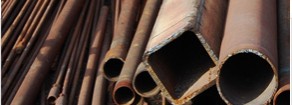Ferrous Metals

Best Ferrous Metals For Scrapping
Metal scrapping is a very easy and convenient way to make some quick cash if you know where to pick up a lot of excess metal. However not everyone who tries to do so realizes that there are two different types of metals a scrap yard will separate your findings into, each varying in value. Ferrous and non ferrous, or iron containing and non-iron containing, respectively. So what are the Best Ferrous Metals For Scrapping?
Ferrous Metals
Ferrous metals include mild steel, carbon steel, stainless steel, cast iron, and wrought iron. These metals are very viable for their incredible strength, being used in the tallest buildings in the world along with the longest spanning bridges, if something needs to be incredibly wide or incredibly tall and support a whole lot of weight, ferrous metals are used. Ferrous metals have 2 distinct properties that are going to help you visually distinguish them from non ferrous metals. Due to large amounts in ferrous alloys, they tend to rust, so if you see rust it’s most likely a ferrous metal. They also have a habit of being magnetic so if it sticks, you’ve probably found yourself ferrous metal. These metals are often found in construction of houses and buildings, rails used for transporting, large piping, and automobiles. They are also used to make your tools and knives, so you probably have them sitting in your kitchen as you’re reading this.
Which Is Best
In the long run, all type of ferrous metals are very great for scrapping. The value of each fluctuates often month to month. It just depends on what’s being brought in more at the time. It’s a safe bet to assume if you gather a material such as stainless steel it will go for a higher price due to it’s resistance to rust as well as being less commonly used. This however should not scare you away from collecting all metals you find and bringing them in, as scrapping is a lot more important than you might have though.
Scrapping is a pivotal market in the recycling movement and the scrapping of ferrous metals made up for nearly half of the steel production nearly 10 years ago. Help your local scrapper out by bringing in any extra metal you find laying around, you make a quick buck and you support a local business in the process, as well as contributing to keeping a cleaner world by recycling materials.

